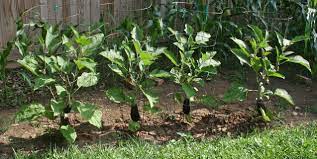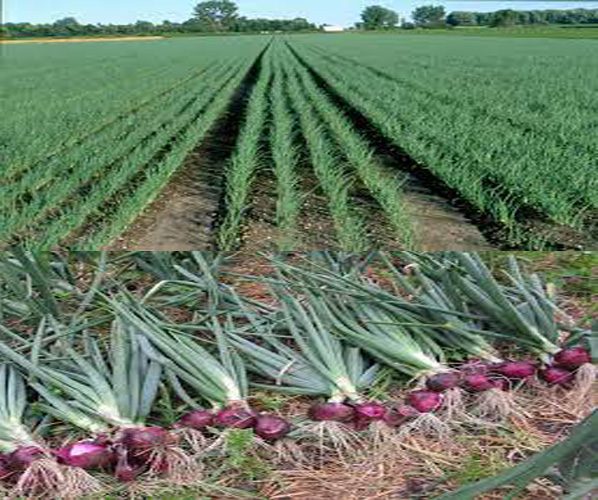Because it is a warm-season crop and because you will like eating it, eggplant is related to tomatoes and peppers. When the time comes to harvest these wonderful, adaptable plants, growing eggplants can be extremely satisfying. You are guaranteed a decent harvest by knowing what eggplants require to grow and thrive.
Interestingly, eggplant can be planted in a home garden or farmland on large scale, the steps involved in eggplant cultivation include farmland preparation, preparing the nursery, seed selection, transplanting, eggplant care, fertilizer and irrigation, and harvesting.
If you are interested to grow eggplants, this article is prepared as a step-by-step guide to help you successfully grow eggplant.
How to Grow Eggplant
Growing eggplant is not as difficult as you might have thought. To assist you, we’ve put together the detailed instructions below that you can follow from beginning to end.
Read Also: [Guide] How To Grow Parsley [Grow In Bag And Pots]
Step 1: Site Selection
The first step in growing eggplants is to find and choose a suitable location for the plants. Eggplants prefer a location with direct sunlight. Select a planting location that receives at least six hours of direct sunlight per day and an adequate water supply.
Read Also: How To Grow Cucumber In Pots & Container
Also, eggplants grow best in loamy, well-draining soil with a pH of 6.0 to 6.5. A soil test can help you determine whether your soil is alkaline or acidic.
Step 2: Farmland Preparation
To prepare your farmland or garden to grow eggplant, you can manually or mechanically plow and harrow the land to make it suitable for planting. Make 1.0 m-wide furrows. Spread 1-2 handfuls of manure per hill along rows or hills. Complete fertilizer (14-14-14) should be used at 10-15 g/hill and lightly covered with soil.
Read Also: How To Grow Tomatoes In Grow Bag [Expert Tips]
Step 3: Seed Selection
You should obtain quality eggplant seedlings because it will determine the yield level during harvest. Ensure you inspect the seedlings before purchase.
You can buy seedlings for direct planting or already sprouted seedlings from a trusted source. Black beauty, black magic, purple rain, early bird, black bell, and dusky are our top recommendations.
Step 4: Transplanting
Start seeds on a nursery farm or indoors, planting them 1/4 inch deep in flats or peat pots. Transfer the already germinated seeds to the main farmland in rows 3 feet apart in holes 24 to 30 inches apart. If soil temperatures aren’t yet high enough, cover the soil with black plastic mulch before planting transplants.
Set 24-inch-high stakes 1 to 2 inches apart from each plant or use cages to provide support and avoid disturbing the soil or roots later. When laden with fruit, eggplant will topple over.
Also, water thoroughly after planting. Mulch the area to keep moisture in and weeds out.
Step 5: Eggplant Care
Weeding your garden is an important part of eggplant maintenance. Weeding should be part of your regular gardening routine. Weeding in the morning when the soil is damp will make it easier to remove weeds. Weeding frequently can help keep fungus and verticillium wilt away from your plants.
During extremely hot weather, consider using mulch to keep the soil moist, warm, and weed-free.
Step 6: Fertilizer and Irrigation
Every 2 weeks or so, apply a balanced fertilizer. Mix 1 inch of well-rotted manure, compost, or a general fertilizer such as 5-10-5 throughout the planting bed about a week before planting to improve soil fertility.
Eggplants thrive in soil with consistent moisture. Water frequently, especially when the plants are young, to encourage deep root development. To prevent disease, avoid overhead watering. In general, eggplants should receive one inch (2.5 cm) of rain or water per week.
Step 7: Harvesting
Depending on the variety, transplanted eggplants take 65 to 80 days to mature, while directly planted seedlings mature between 100–120 days. Once your eggplants are ripened, don’t put off harvesting too long! Harvesting can be done by plucking the seedlings from the plant.
What Is The Best Way To Grow Eggplants?
The ideal method for growing eggplant is sowing the eggplant seedlings in a sunny area that receives six to eight hours of direct sunshine per day. The soil should have good drainage and be heavily modified with compost. In soil with a pH between 5.5 and 7.0, eggplant thrives.
How Long Does It Take To Grow Eggplants?
It takes eggplants around 70 to 80 days to grow.
What Is The Secret To Growing Eggplant?
The key to successfully growing eggplant is to provide it with lots of light.
Does Eggplant Need A Trellis?
Yes, the trellis is necessary to provide support for eggplants. When growing eggplants, it’s a good idea to build support to prevent the fruit from contacting the ground. This lowers the danger of illness and promotes fruit shape, especially for elongated eggplant kinds.
What Month Do You Plant Eggplant?
The best month to plant eggplant is late October. This is because eggplant optimal performance is when the soil is warm at about 50 degrees Fahrenheit or higher which can support the growth of eggplants.
What Should You Not Plant Next To Eggplant?
You should not plant fennel near your eggplants because it impedes the growth of several plants, including eggplant. Also, avoid planting geraniums with eggplant since they can harbor diseases like root rot and leaf blight that also affect eggplant.
Do Eggplants Need A Lot Of Water?
During hot climates, young eggplants water twice weekly to a depth of 12 inches. However, be aware that standing water is not good for eggplants.
Do Eggplants Grow Back Every Year?
Because eggplants are perennial plants, they grow back every year.
What Is The Best Fertilizer For Eggplants?
The best fertilizer for eggplant is a balanced fertilizer that is 10-10-10.
How Do I Make My Eggplant Bear More Fruit?
Pollinate the blooms by hand to help the crop grow. Additionally, the higher the fruit set, the more frequently the fruits are collected.
Should I Pinch off Eggplant Flowers?
Pinch the first batch of blooms as they bud to get your plant to focus more energy on developing strong stalks and extensive roots rather than generating fresh fruit right away.
Is Coffee Grounds Good For Eggplants?
Coffee grounds are good for eggplants because they ensure the soil reaches the proper pH level that can let your eggplants thrive.
Can You Plant Eggplant Next To Tomatoes?
Yes! Both eggplant and tomatoes are members of the nightshade family, and they share similar growing requirements. Just make sure to give them both a lot of space and organic material, such as compost if you intend to plant them next to each other.
How Tall Do Eggplants Get?
Eggplants can grow up to 2 to 4 feet tall.
How Much Room Does An Eggplant Need?
The ideal space for eggplants is 18 inches apart, in rows 30 to 36 inches apart.
Does Eggplant Grow Well In Containers?
Eggplant grows well in containers if quality soil or compost is used and exposed to sufficient daily sunlight.
Can You Plant Two Eggplants Together?
You can plant two eggplants together but you have to space them so they can grow properly.
What Grows Well With Eggplants?
Peppers, tomatoes, potatoes, and spinach are great companions for eggplants.
Is Epsom Salt Good For Eggplants?
Epsom salt is good for eggplants because the solution enhances the fruit set. However, the application should not be too much and should be according to the type.
What Is The Best Natural Fertilizer For Eggplant?
The best natural fertilizer for eggplant is dried chicken dung.
Why Are My Eggplants Not Getting Big?
Cold or frost weather is the major reason why your eggplants are not getting big because eggplants prefer hot sunny weather.
How To Grow Eggplant From Seeds
- Prepare your garden and build elevated farm beds.
- Irrigate the farm beds mildly
- Directly plant the seedlings on the farm beds, spacing them 15 to 20 inches apart to allow for growth.
- Water frequently
- Weeding
- Use of fertilizers
- Thin out the rows by 50% once the eggplants start to show flower buds.
Growing Eggplant In Pots
- Get your planting pot
- Pour the soil mixture into the pot and water lightly
- Place two seeds, one-fourth of an inch deep, into each pot
- Cover the seedlings with the potting mix, and water
- Mulch the soil if the weather is extreme.
- Watch out for weeds and pest
How To Grow Eggplant Vertically
You’ll need a container (like a 5-gallon or 19-liter bucket, preferably with a handle that can be used for hanging), potting soil, eggplants, and wire to hang the container with to grow eggplants vertically.
- The bucket should be turned over with the bottom facing up.
- Make a hole in the center of the bottom with a 3-inch (8 cm) circular bit; this is where the transplanted eggplant will go.
- Gently place the transplant through the hole that was drilled. Feed the top of the plant through the hole rather than the rootball because the top of the seedling is smaller than the rootball.
- To stop soil from escaping the hole, place a temporary barrier (newspaper, landscape fabric, or a coffee filter) at the bottom of the container.
- Hold the plant in place as you add potting soil to the bucket. You might want to do this when the container is supported by something similar to sawhorses.
- To ensure proper drainage and nourishment, layer soil, compost, then soil again.
- Lightly press the earth down.
Growing Eggplant Problems
Disease and pest infestation are the two main issues with growing eggplants. These crops are susceptible to several eggplant illnesses such as blossom end rot, wilt illnesses, and other blights are some of the most prevalent. Crop rotation, weed control, correct spacing, and consistent watering can all help eradicate or prevent many of these eggplant illnesses.
How Long Does It Take For An Eggplant To Grow After Flowering?
It takes eggplant 50 to 80 days after flowering to grow. It however depends on different cultivars of eggplant.
How To Grow Eggplant From Seeds In Pots
- Prepare or buy pot mixing
- Put the soil mixture in the pot.
- Water the soil mildly
- Pour two seeds, one-fourth of an inch deep, inside each pot after adding the seed-starting mix to the pots.
- Add potting mix, then sprinkle with water.
- The pot should be covered with plastic wrap or a humidity dome.
- The seeds should germinate in 10 to 21 days if you keep them warm, wet, and dry.
Eggplant Production
Eggplant is a widely cultivated plant typically in the United States. The plant is annually cultivated commercially worldwide to be used as food. Eggplant production is a massive industry that serves as an important source of making money.
How Long Do Eggplant Plants Live
The majority of eggplant varieties are planted as annuals and only last one year.
Conclusion
I hope you have learned something about how to grow eggplants. Growing eggplants go beyond just a hobby it is a lucrative venture in that you can make money. I hope you find this article helpful if you intend to grow eggplants.




